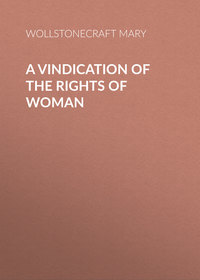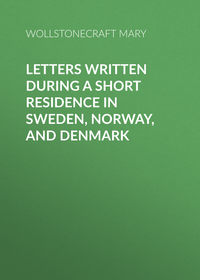 полная версия
полная версияMary
She was now an heiress, and her mother began to think her of consequence, and did not call her the child. Proper masters were sent for; she was taught to dance, and an extraordinary master procured to perfect her in that most necessary of all accomplishments.
A part of the estate she was to inherit had been litigated, and the heir of the person who still carried on a Chancery suit, was only two years younger than our heroine. The fathers, spite of the dispute, frequently met, and, in order to settle it amicably, they one day, over a bottle, determined to quash it by a marriage, and, by uniting the two estates, to preclude all farther enquiries into the merits of their different claims.
While this important matter was settling, Mary was otherwise employed. Ann's mother's resources were failing; and the ghastly phantom, poverty, made hasty strides to catch them in his clutches. Ann had not fortitude enough to brave such accumulated misery; besides, the canker-worm was lodged in her heart, and preyed on her health. She denied herself every little comfort; things that would be no sacrifice when a person is well, are absolutely necessary to alleviate bodily pain, and support the animal functions.
There were many elegant amusements, that she had acquired a relish for, which might have taken her mind off from its most destructive bent; but these her indigence would not allow her to enjoy: forced then, by way of relaxation, to play the tunes her lover admired, and handle the pencil he taught her to hold, no wonder his image floated on her imagination, and that taste invigorated love.
Poverty, and all its inelegant attendants, were in her mother's abode; and she, though a good sort of a woman, was not calculated to banish, by her trivial, uninteresting chat, the delirium in which her daughter was lost.
This ill-fated love had given a bewitching softness to her manners, a delicacy so truly feminine, that a man of any feeling could not behold her without wishing to chase her sorrows away. She was timid and irresolute, and rather fond of dissipation; grief only had power to make her reflect.
In every thing it was not the great, but the beautiful, or the pretty, that caught her attention. And in composition, the polish of style, and harmony of numbers, interested her much more than the flights of genius, or abstracted speculations.
She often wondered at the books Mary chose, who, though she had a lively imagination, would frequently study authors whose works were addressed to the understanding. This liking taught her to arrange her thoughts, and argue with herself, even when under the influence of the most violent passions.
Ann's misfortunes and ill health were strong ties to bind Mary to her; she wished so continually to have a home to receive her in, that it drove every other desire out of her mind; and, dwelling on the tender schemes which compassion and friendship dictated, she longed most ardently to put them in practice.
Fondly as she loved her friend, she did not forget her mother, whose decline was so imperceptible, that they were not aware of her approaching dissolution. The physician, however, observing the most alarming symptoms; her husband was apprised of her immediate danger; and then first mentioned to her his designs with respect to his daughter.
She approved of them; Mary was sent for; she was not at home; she had rambled to visit Ann, and found her in an hysteric fit. The landlord of her little farm had sent his agent for the rent, which had long been due to him; and he threatened to seize the stock that still remained, and turn them out, if they did not very shortly discharge the arrears.
As this man made a private fortune by harassing the tenants of the person to whom he was deputy, little was to be expected from his forbearance.
All this was told to Mary—and the mother added, she had many other creditors who would, in all probability, take the alarm, and snatch from them all that had been saved out of the wreck. "I could bear all," she cried; "but what will become of my children? Of this child," pointing to the fainting Ann, "whose constitution is already undermined by care and grief—where will she go?"—Mary's heart ceased to beat while she asked the question—She attempted to speak; but the inarticulate sounds died away. Before she had recovered herself, her father called himself to enquire for her; and desired her instantly to accompany him home.
Engrossed by the scene of misery she had been witness to, she walked silently by his side, when he roused her out of her reverie by telling her that in all likelihood her mother had not many hours to live; and before she could return him any answer, informed her that they had both determined to marry her to Charles, his friend's son; he added, the ceremony was to be performed directly, that her mother might be witness of it; for such a desire she had expressed with childish eagerness.
Overwhelmed by this intelligence, Mary rolled her eyes about, then, with a vacant stare, fixed them on her father's face; but they were no longer a sense; they conveyed no ideas to the brain. As she drew near the house, her wonted presence presence of mind returned: after this suspension of thought, a thousand darted into her mind,—her dying mother,—her friend's miserable situation,—and an extreme horror at taking—at being forced to take, such a hasty step; but she did not feel the disgust, the reluctance, which arises from a prior attachment.
She loved Ann better than any one in the world—to snatch her from the very jaws of destruction—she would have encountered a lion. To have this friend constantly with her; to make her mind easy with respect to her family, would it not be superlative bliss?
Full of these thoughts she entered her mother's chamber, but they then fled at the sight of a dying parent. She went to her, took her hand; it feebly pressed her's. "My child," said the languid mother: the words reached her heart; she had seldom heard them pronounced with accents denoting affection; "My child, I have not always treated you with kindness—God forgive me! do you?"—Mary's tears strayed in a disregarded stream; on her bosom the big drops fell, but did not relieve the fluttering tenant. "I forgive you!" said she, in a tone of astonishment.
The clergyman came in to read the service for the sick, and afterwards the marriage ceremony was performed. Mary stood like a statue of Despair, and pronounced the awful vow without thinking of it; and then ran to support her mother, who expired the same night in her arms.
Her husband set off for the continent the same day, with a tutor, to finish his studies at one of the foreign universities.
Ann was sent for to console her, not on account of the departure of her new relation, a boy she seldom took any notice of, but to reconcile her to her fate; besides, it was necessary she should have a female companion, and there was not any maiden aunt in the family, or cousin of the same class.
CHAP. VI
Mary was allowed to pay the rent which gave her so much uneasiness, and she exerted every nerve to prevail on her father effectually to succour the family; but the utmost she could obtain was a small sum very inadequate to the purpose, to enable the poor woman to carry into execution a little scheme of industry near the metropolis.
Her intention of leaving that part of the country, had much more weight with him, than Mary's arguments, drawn from motives of philanthropy and friendship; this was a language he did not understand; expressive of occult qualities he never thought of, as they could not be seen or felt.
After the departure of her mother, Ann still continued to languish, though she had a nurse who was entirely engrossed by the desire of amusing her. Had her health been re-established, the time would have passed in a tranquil, improving manner.
During the year of mourning they lived in retirement; music, drawing, and reading, filled up the time; and Mary's taste and judgment were both improved by contracting a habit of observation, and permitting the simple beauties of Nature to occupy her thoughts.
She had a wonderful quickness in discerning distinctions and combining ideas, that at the first glance did not appear to be similar. But these various pursuits did not banish all her cares, or carry off all her constitutional black bile. Before she enjoyed Ann's society, she imagined it would have made her completely happy: she was disappointed, and yet knew not what to complain of.
As her friend could not accompany her in her walks, and wished to be alone, for a very obvious reason, she would return to her old haunts, retrace her anticipated pleasures–and wonder how they changed their colour in possession, and proved so futile.
She had not yet found the companion she looked for. Ann and she were not congenial minds, nor did she contribute to her comfort in the degree she expected. She shielded her from poverty; but this was only a negative blessing; when under the pressure it was very grievous, and still more so were the apprehensions; but when when exempt from them, she was not contented.
Such is human nature, its laws were not to be inverted to gratify our heroine, and stop the progress of her understanding, happiness only flourished in paradise—we cannot taste and live.
Another year passed away with increasing apprehensions. Ann had a hectic cough, and many unfavourable prognostics: Mary then forgot every thing but the fear of losing her, and even imagined that her recovery would have made her happy.
Her anxiety led her to study physic, and for some time she only read books of that cast; and this knowledge, literally speaking, ended in vanity and vexation of spirit, as it enabled her to foresee what she could not prevent.
As her mind expanded, her marriage appeared appeared a dreadful misfortune; she was sometimes reminded of the heavy yoke, and bitter was the recollection!
In one thing there seemed to be a sympathy between them, for she wrote formal answers to his as formal letters. An extreme dislike took root in her mind; the found of his name made her turn sick; but she forgot all, listening to Ann's cough, and supporting her languid frame. She would then catch her to her bosom with convulsive eagerness, as if to save her from sinking into an opening grave.
CHAP. VII
It was the will of Providence that Mary should experience almost every species of sorrow. Her father was thrown from his horse, when his blood was in a very inflammatory state, and the bruises were very dangerous; his recovery was not expected by the physical tribe.
Terrified at seeing him so near death, and yet so ill prepared for it, his daughter sat by his bed, oppressed by the keenest anguish, which her piety increased.
Her grief had nothing selfish in it; he was not a friend or protector; but he was her father, an unhappy wretch, going into eternity, depraved and thoughtless. Could a life of sensuality be a preparation for a peaceful death? Thus meditating, she passed the still midnight hour by his bedside.
The nurse fell asleep, nor did a violent thunder storm interrupt her repose, though it made the night appear still more terrific to Mary. Her father's unequal breathing alarmed her, when she heard a long drawn breath, she feared it was his last, and watching for another, a dreadful peal of thunder struck her ears. Considering the separation of the soul and body, this night seemed sadly solemn, and the hours long.
Death is indeed a king of terrors when he attacks the vicious man! The compassionate heart finds not any comfort; but dreads an eternal separation. No transporting greetings are anticipated, when the survivors also shall have finished their their course; but all is black!—the grave may truly be said to receive the departed—this is the sting of death!
Night after night Mary watched, and this excessive fatigue impaired her own health, but had a worse effect on Ann; though she constantly went to bed, she could not rest; a number of uneasy thoughts obtruded themselves; and apprehensions about Mary, whom she loved as well as her exhausted heart could love, harassed her mind. After a sleepless, feverish night she had a violent fit of coughing, and burst a blood-vessel. The physician, who was in the house, was sent for, and when he left the patient, Mary, with an authoritative voice, insisted on knowing his real opinion. Reluctantly he gave it, that her friend was in a critical state; and if she passed the approaching winter in England, he imagined she would die in the spring; a season fatal to consumptive disorders. The spring!—Her husband was then expected.—Gracious Heaven, could she bear all this.
In a few days her father breathed his last. The horrid sensations his death occasioned were too poignant to be durable: and Ann's danger, and her own situation, made Mary deliberate what mode of conduct she should pursue. She feared this event might hasten the return of her husband, and prevent her putting into execution a plan she had determined on. It was to accompany Ann to a more salubrious climate.
CHAP. VIII
I mentioned before, that Mary had never had any particular attachment, to give rise to the disgust that daily gained ground. Her friendship for Ann occupied her heart, and resembled a passion. She had had, indeed, several transient likings; but they did not amount to love. The society of men of genius delighted her, and improved her faculties. With beings of this class she did not often meet; it is a rare genus; her first favourites were men past the meridian of life, and of a philosophic turn.
Determined on going to the South of France, or Lisbon; she wrote to the man she had promised to obey. The physicians had said change of air was necessary for her as well as her friend. She mentioned this, and added, "Her comfort, almost her existence, depended on the recovery of the invalid she wished to attend; and that should she neglect to follow the medical advice she had received, she should never forgive herself, or those who endeavoured to prevent her." Full of her design, she wrote with more than usual freedom; and this letter was like most of her others, a transcript of her heart.
"This dear friend," she exclaimed, "I love for her agreeable qualities, and substantial virtues. Continual attention to her health, and the tender office of a nurse, have created an affection very like a maternal one—I am her only support, she leans on me—could I forsake the forsaken, and break the bruised reed—No—I would die first! I must—I will go."
She would have added, "you would very much oblige me by consenting;" but her heart revolted—and irresolutely she wrote something about wishing him happy.—"Do I not wish all the world well?" she cried, as she subscribed her name—It was blotted, the letter sealed in a hurry, and sent out of her sight; and she began to prepare for her journey.
By the return of the post she received an answer; it contained some common-place remarks on her romantic friendship, as he termed it; "But as the physicians advised change of air, he had no objection."
CHAP. IX
There was nothing now to retard their journey; and Mary chose Lisbon rather than France, on account of its being further removed from the only person she wished not to see.
They set off accordingly for Falmouth, in their way to that city. The journey was of use to Ann, and Mary's spirits were raised by her recovered looks—She had been in despair—now she gave way to hope, and was intoxicated with it. On ship-board Ann always remained in the cabin; the sight of the water terrified her: on the contrary, Mary, after she was gone to bed, or when she fell asleep in the day, went on deck, conversed with the sailors, and surveyed the boundless expanse before her with delight. One instant she would regard the ocean, the next the beings who braved its fury. Their insensibility and want of fear, she could not name courage; their thoughtless mirth was quite of an animal kind, and their feelings as impetuous and uncertain as the element they plowed.
They had only been a week at sea when they hailed the rock of Lisbon, and the next morning anchored at the castle. After the customary visits, they were permitted to go on shore, about three miles from the city; and while one of the crew, who understood the language, went to procure them one of the ugly carriages peculiar to the country, they waited in the Irish convent, which is situated close to the Tagus.
Some of the people offered to conduct them into the church, where there was a fine organ playing; Mary followed them, but Ann preferred staying with a nun she had entered into conversation with.
One of the nuns, who had a sweet voice, was singing; Mary was struck with awe; her heart joined in the devotion; and tears of gratitude and tenderness flowed from her eyes. My Father, I thank thee! burst from her—words were inadequate to express her feelings. Silently, she surveyed the lofty dome; heard unaccustomed sounds; and saw faces, strange ones, that she could not yet greet with fraternal love.
In an unknown land, she considered that the Being she adored inhabited eternity, was ever present in unnumbered worlds. When she had not any one she loved near her, she was particularly sensible of the presence of her Almighty Friend.
The arrival of the carriage put a stop to her speculations; it was to conduct them to an hotel, fitted up for the reception of invalids. Unfortunately, before they could reach it there was a violent shower of rain; and as the wind was very high, it beat against the leather curtains, which they drew along the front of the vehicle, to shelter themselves from it; but it availed not, some of the rain forced its way, and Ann felt the effects of it, for she caught cold, spite of Mary's precautions.
As is the custom, the rest of the invalids, or lodgers, sent to enquire after their health; and as soon as Ann left her chamber, in which her complaints seldom confined her the whole day, they came in person to pay their compliments. Three fashionable females, and two gentlemen; the one a brother of the eldest of the young ladies, and the other an invalid, who came, like themselves, for the benefit of the air. They entered into conversation immediately.
People who meet in a strange country, and are all together in a house, soon get acquainted, without the formalities which attend visiting in separate houses, where they are surrounded by domestic friends. Ann was particularly delighted at meeting with agreeable society; a little hectic fever generally made her low-spirited in the morning, and lively in the evening, when she wished for company. Mary, who only thought of her, determined to cultivate their acquaintance, as she knew, that if her mind could be diverted, her body might gain strength.
They were all musical, and proposed having little concerts. One of the gentlemen played on the violin, and the other on the german-flute. The instruments were brought in, with all the eagerness that attends putting a new scheme in execution.
Mary had not said much, for she was diffident; she seldom joined in general conversations; though her quickness of penetration enabled her soon to enter into the characters of those she conversed with; and her sensibility made her desirous of pleasing every human creature. Besides, if her mind was not occupied by any particular sorrow, or study, she caught reflected pleasure, and was glad to see others happy, though their mirth did not interest her.
This day she was continually thinking of Ann's recovery, and encouraging the cheerful hopes, which though they dissipated the spirits that had been condensed by melancholy, yet made her wish to be silent. The music, more than the conversation, disturbed her reflections; but not at first. The gentleman who played on the german-flute, was a handsome, well-bred, sensible man; and his observations, if not original, were pertinent.
The other, who had not said much, began to touch the violin, and played a little Scotch ballad; he brought such a thrilling sound out of the instrument, that Mary started, and looking at him with more attention than she had done before, and saw, in a face rather ugly, strong lines of genius. His manners were awkward, that kind of awkwardness which is often found in literary men: he seemed a thinker, and delivered his opinions in elegant expressions, and musical tones of voice.
When the concert was over, they all retired to their apartments. Mary always slept with Ann, as she was subject to terrifying dreams; and frequently in the night was obliged to be supported, to avoid suffocation. They chatted about their new acquaintance in their own apartment, and, with respect to the gentlemen, differed in opinion.
CHAP. X
Every day almost they saw their new acquaintance; and civility produced intimacy. Mary sometimes left her friend with them; while she indulged herself in viewing new modes of life, and searching out the causes which produced them. She had a metaphysical turn, which inclined her to reflect on every object that passed by her; and her mind was not like a mirror, which receives every floating image, but does not retain them: she had not any prejudices, for every opinion was examined before it was adopted.
The Roman Catholic ceremonies attracted her attention, and gave rise to conversations when they all met; and one of the gentlemen continually introduced deistical notions, when he ridiculed the pageantry they all were surprised at observing. Mary thought of both the subjects, the Romish tenets, and the deistical doubts; and though not a sceptic, thought it right to examine the evidence on which her faith was built. She read Butler's Analogy, and some other authors: and these researches made her a christian from conviction, and she learned charity, particularly with respect to sectaries; saw that apparently good and solid arguments might take their rise from different points of view; and she rejoiced to find that those she should not concur with had some reason on their side.
CHAP. XI
When I mentioned the three ladies, I said they were fashionable women; and it was all the praise, as a faithful historian, I could bestow on them; the only thing in which they were consistent. I forgot to mention that they were all of one family, a mother, her daughter, and niece. The daughter was sent by her physician, to avoid a northerly winter; the mother, her niece, and nephew, accompanied her.
They were people of rank; but unfortunately, though of an ancient family, the title had descended to a very remote branch—a branch they took care to be intimate with; and servilely copied the Countess's airs. Their minds were shackled with a set of notions concerning propriety, the fitness of things for the world's eye, trammels which always hamper weak people. What will the world say? was the first thing that was thought of, when they intended doing any thing they had not done before. Or what would the Countess do on such an occasion? And when this question was answered, the right or wrong was discovered without the trouble of their having any idea of the matter in their own heads. This same Countess was a fine planet, and the satellites observed a most harmonic dance around her.
After this account it is scarcely necessary to add, that their minds had received very little cultivation. They were taught French, Italian, and Spanish; English was their vulgar tongue. And what did they learn? Hamlet will tell you—words—words. But let me not forget that they squalled Italian songs in the true gusto. Without having any seeds sown in their understanding, or the affections of the heart set to work, they were brought out of their nursery, or the place they were secluded in, to prevent their faces being common; like blazing stars, to captivate Lords.
They were pretty, and hurrying from one party of pleasure to another, occasioned the disorder which required change of air. The mother, if we except her being near twenty years older, was just the same creature; and these additional years only served to make her more tenaciously adhere to her habits of folly, and decide with stupid gravity, some trivial points of ceremony, as a matter of the last importance; of which she was a competent judge, from having lived in the fashionable world so long: that world to which the ignorant look up as we do to the sun.






